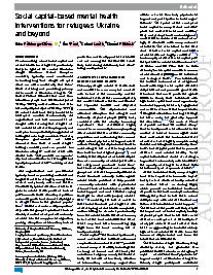Social capital-based mental health interventions for refugees : Ukraine and beyond.
New knowledge about social capital and mental health for refugees is particularly timely in light of the current Ukrainian refugee situation. Several European countries, typically more accustomed to funding large-scale refugee aid operations on other continents, find themselves receiving and providing primary aid to waves of Ukrainian refugees. The United Nations estimates that more than 6.8 million people have left Ukraine (as of 29 May 20221), and 7.1 million have been internally displaced (as of 23 May 20222); the actual totals have likely increased in subsequent months. Governments, aid organisations and host communities are charged with ensuring that refugees are safe and receive all necessary support, and must plan for a potentially long period of hosting them in large numbers. However, European governments are better resourced than those of most refugee-hosting countries, and can provide for Ukrainian refugees’ material needs with relative ease. This provides an opportunity for extra attention to less tangible but equally important needs—notably, mental health.
Aid organisations and practitioners typically focus on providing materials and tangible services to refugees, among them medical care, food, water and shelter. Nonetheless, special attention needs to be given to mental health problems such as post-traumatic stress disorder, depression and anxiety, which are dramatically higher in refugees than in the general population.3 Children remain a disproportionately affected group: experiences such as attacks, recruitment of parents or family members into the army, forced migration, poverty, disruption of education, lack of protection and security, and loss of healthcare are among the stressful life events that, lived during childhood, have devastating consequences.
Geachte bezoeker,
De informatie die u nu opvraagt, kan door psychotraumanet niet aan u worden getoond. Dit kan verschillende redenen hebben,
waarvan (bescherming van het) auteursrecht de meeste voorkomende is. Wanneer het mogelijk is om u door te verwijzen naar de bron
van deze informatie, dan ziet u hier onder een link naar die plek.
Als er geen link staat, kunt u contact opnemen met de bibliotheek,
die u verder op weg kan helpen.
Met vriendelijke groet,
Het psychotraumanet-team.
In: Journal of Epidemiology and Community Health : ISSN: 1470-2738 | 77 | 4 | 205-208
http://dx.doi.org/10.1136/jech-2022-219315


